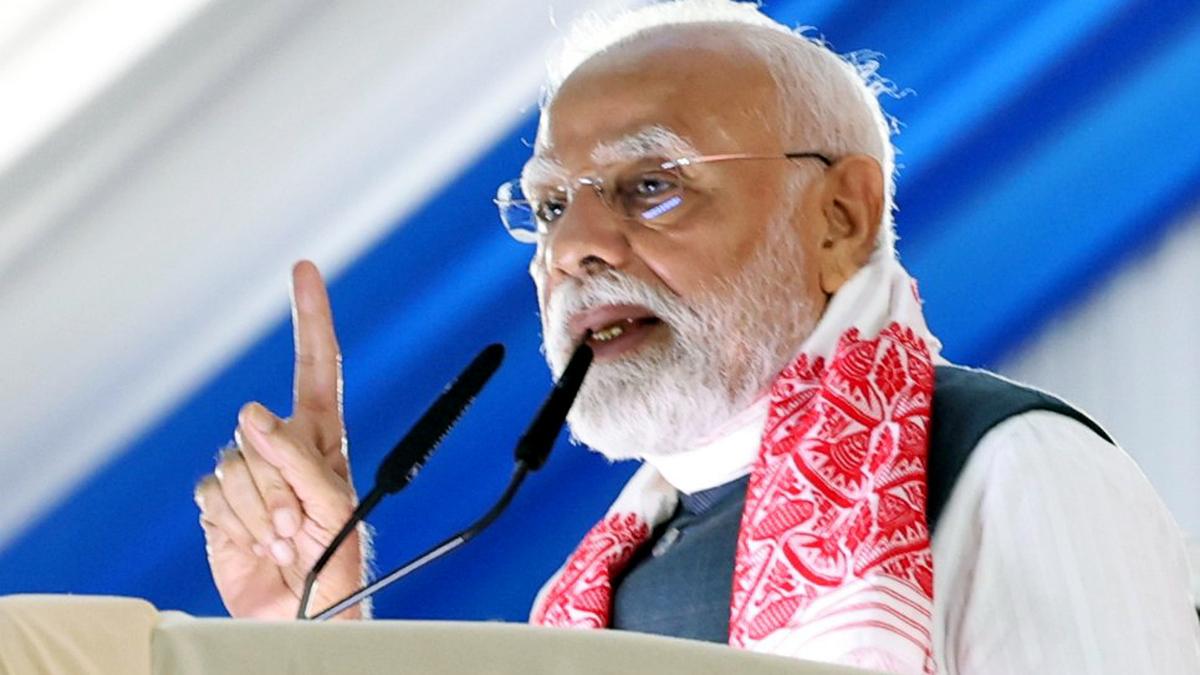Narendra Modi has many times defied electoral compulsions for a larger national purpose.
| Photo Credit: ANI
As Prime Minister Narendra Modi turns 75 on September 17, the question worth asking is not about his electoral longevity or political craft. Rather, the question should be what explains his resonance with India’s people, across divides of geography, languages, class, and generation? Why does his leadership feel larger than the immediate churn of day-to-day politics? The answer, I believe, lies in qualities that are timeless. They are the very traits by which history remembers its great.
History remembers those who build nations, not those who merely govern. Take for example Abraham Lincoln. His greatness lies not only in preserving the Union but in his moral clarity against slavery, even when it risked tearing America apart. Mr. Modi’s nation-building project is cast in a similar mould: decisions that may appear disruptive in the short run but are designed for the long arc of India’s rise. Whether abrogating Article 370, bringing in the Citizenship (Amendment) Act or restructuring taxation through the Goods and Service Tax, his purpose has always been long-term nation building.
Leaders who change nations often do so while ignoring the personal risk. Franklin D. Roosevelt, faced with the Great Depression, defied orthodoxy with the New Deal. Mr. Modi, too, has umpteen times defied electoral compulsions for larger national purpose, perhaps most vividly during demonetisation in November 2016. Every electoral instinct advised against such a major upheaval just three months before the crucial Uttar Pradesh 2017 Assembly election. The possibility of things going wrong was most severe in a poor State like Uttar Pradesh. Yet Mr. Modi took the risk. It underlined an eternal leadership trait: the willingness to stake personal standing for what one believes to be the larger national good.
Larger vision
Every great leader also carries a vision larger than themselves. Chandragupta Maurya imagined a subcontinental empire; Shivaji sowed the seeds of Hindavi Swaraj. Mr. Modi’s articulation of a “New India” resonates in this lineage. The contours of his vision are clear: an India that is self-confident, technologically modern, rooted in civilisational depth, and unwilling to settle for a subordinate place in world affairs. Such visions galvanise societies not only by policy but by altering the imagination of the people of what is possible.
Leadership is also about reshaping character. Sport offers a powerful analogy. The Indian cricket team of the 2000s shed its hesitancy and embraced self-belief and a victorious attitude; the result was not just world titles on the field but shift in the dynamics of cricket world itself. Mr. Modi’s leadership has nudged India in a similar way. A nation once too ready to accept second-best now demands parity on the global stage. This shift is visible in economic diplomacy, in climate negotiations, in the way India responds to geostrategic issues. Leaders who can alter the very temperament of their people — that is when nations truly make epochal change.
Another enduring quality is the ability to fuse ideals with workable solutions, the mark of Benjamin Franklin, remembered not only as a founding father of the U.S. but also as a practical innovator. Mr. Modi’s governance bears this stamp: a ceaseless emphasis on innovation at scale. From Jan Dhan bank accounts and Aadhaar-linked welfare to UPI-powered digital payments, his instinct is to bend technology to solve everyday problems. This is not abstract idealism; it is applied wisdom that endures in institutional memory.
Moral authority also defines leadership. Mr. Modi’s personal austerity — no family, political patronage, or personal indulgence — has become a source of moral weight far more consequential than politically expedient alliances. In a political culture scarred by dynastic privilege and personal aggrandisement, this quality resonates deeply with ordinary Indians. Leaders are remembered not only by their words but also by the example they set.
Ultimately, the most telling measure of leadership is the relationship with power itself. On January 22, 2024, after the visuals of the consecration of the Ram Mandir in Ayodhya, I first informally described Mr. Modi on social media as a Rajrishi — a title which was once used for Mithila’s sage-like king Janak. Since then, the English moniker “Priest King” has also been used extensively for him. The significance lies not in the title but in what it conveys. History shows that leaders — Lincoln in the corridors of Congress, for example, while getting the anti-slavery bill passed — have sometimes used sharp tactics to gain power. Mr. Modi too has used edgy practices to attain or retain power. What matters, however, is how that power is then exercised. Mr. Modi has never deployed political power, once attained, for personal enrichment. His use of power has been singularly nation-first. That is why Opposition attacks do not stick and people do not judge him for the means he deploys. For the people know that what matters in the end, what will matter in history, is how Modi used that power. The moniker of “Priest King”, therefore, sits easily. It signals the rare ability to treat power as an instrument of service or seva, not possession.
At 75, Mr. Modi’s traits of leadership — the nation-builder’s foresight, the reformer’s courage, the visionary’s imagination, the teacher’s ability to change collective character, the innovator’s practicality, the ascetic’s moral authority — will endure in the ledger of history. Mr. Modi has entered that bracket. And it is from there, ultimately, that posterity will judge him.
(Akhilesh Mishrav is CEO, BlueKraft Digital Foundation; views expressed are personal)
Published – September 16, 2025 08:24 pm IST

